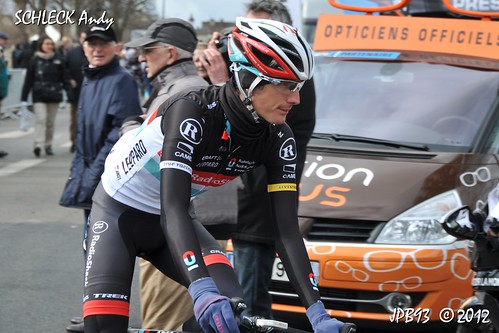Andy Schleck has probably forgotten more about bike riding than most of us will ever learn. but the one thing he is yet to learn is perhaps the lesson he most needs: Success begets success.
Image by Jean Pierre Belot on Flickr
(Having typed that, I’m suddenly doubtful. Most of us can: get down a hill without soiling our nappy; change gear without coming to a grinding halt; work out that a bike on which we can barely reach the drops of the handlebars probably isn’t the right fit; accept that you don’t win by riding for someone else when you should be attacking.)
But here’s a simple test if you think I’m being unfair: Not including the Tour de France 2010, which he won by default, can you name the last multi-stage race in which Andy Schleck won the overall classification. And for a bonus point what was the last race which Andy Schleck won. * (what I think are the answers at the bottom of this post)
The more consistent I become in gaining world-class results the less doubt there is in my mind. – Bradley Wiggins, on winning Paris-Nice
There’s plenty of knockers for Wiggo – some of them with so little point to what they’re saying you could barely push your way through the skin on a custard with them – but one thing you can’t knock him for is understanding that if you want to win big you have to start winning often.
Look at Alberto Contador and Cadel Evans: when they turn up to race, they don’t turn up just to get round or maybe test their legs on one climb on one stage. They turn up and give the tree a shake because they know that the confidence you gain from a good result is worth far more than another winter spent in the wind tunnel trying to make yourself less like a square rigged sail on a time trial bike.
In consecutive years, on the final climb of the Tour de France, Andy Schleck has turned to them and begged like a child for them to help him or to attack. They in turn have looked back at him with eyes full of the knowledge and confidence that they’ve learned how good a win feels and quite like where they are sitting in his wheel.
Andy seems content to carry on giving isolated stages a bang in the Tours of Switzerland and California while ignoring opportunities to ride the exact route of the decisive stage of the Tour de France in race conditions.
As I look at today’s results, Andy Schleck finished 2 minutes back on stage two of the Volta a Catalunya, back with the crash victims and domestiques. Up in the front group: Wiggins, Gesink, Van den Broeck, Leipheimer. Now that could be simple bad luck, but then again misfortune has a habit of finding easy victims.
His opponents see every race as a chance to start building the trust in colleagues and establish when they need to rely on themselves; to figure out the logistics and interlinking skills needed in a three-week race; to find their voice as a leader and how to motivate their team.
Every race is about practicing good habits, building momentum, learning how to improve your weaker areas and figuring out your rivals. Andy seems to view them as a minor inconvenience to be endured until July and the Tour de France comes round.
Cyrille Guimard who shaped him at VC Roubaix compared his talent to some of his previous charges such as Greg Lemond, Bernard Hinault and the late and much missed Laurent Fignon.
Andy Schleck is 26, an age at which Fignon had two Tours de France to his name and, but for an errant helicopter, should have also had a Giro d’Italia. It’s all very well point to his young rider’s classification jerseys, but as the leading rider of his age by a margin, they aren’t really enough of a return on his talent. Raymond Poulidor may have become mythologised as the eternal second, but he won plenty in his time. Andy Schleck hasn’t won a great deal.
Finally, let’s talk about the Galibier stage of the Tour de France 2011. It’s easy to focus on the attack on the Col d’Izoard and the 2’15” between him and Cadel Evans at the finish. But take a look at that final kilometre to the finish: Evans took 45 seconds back on Schleck. At 5km to go, the gap was 3’15”, at 11km it was 4’15” according to the Cyclingnews account of the stage.
Those 45 seconds made a world of difference the next day when Evans sat tight less than a minute behind Schleck, and the day after that, when he started the time trial with one minute to take back on a course he knew rather than the thick end of two.
* By my reckoning, the last time Andy Schleck won a stage race was the Fleche du Sud in 2004 as an 18-year-old amateur. The last professional race in which he finished first was Liege-Bastogne-Liege in 2009.

